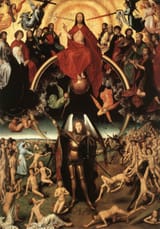Search Results
8/2/2025, 8:56:15 AM
>>512017603
Ancient historians focused on political/military events, not provincial religious phenomena. Earthquakes (Matt. 27:51) were recorded (e.g., Phlegon’s chronicle mentions one around Jesus’ death), but resurrections? Unlikely to make Roman annals.
Even major biblical events lack "secular" confirmation (e.g., the Babylonian Exile’s scale isn’t matched in Persian records). Absence of evidence isn’t evidence of absence.
if "saints" (Matt 27:52) refers to a small group of devout Jews (not mass public resurrections), it wouldn’t ripple beyond Jerusalem’s early Christian community.
The Gospels do record public reactions to Jesus’ miracles (e.g., John 12:9-11), but Roman historians didn’t care about peasant preachers; unless they caused revolts (like Theudas, per Josephus). And Jews themselves who didn't convert wouldn't bother to write it down in their own doctrine; they already considered Jesus a master of dark arts.
Writing to Jews, he highlights apocalyptic signs (earthquake, temple veil) validating Jesus as Messiah. Secular records wouldn’t prioritize this. No opponent (e.g., Celsus, 2nd century) ever mocked this event as fabricated, despite attacking the Resurrection.
If Matthew lied, why invent an easily disprovable claim? Christianity’s enemies had every motive to expose fraud (e.g., Jesus’ empty tomb was guarded, Matt 27:62-66). If it’s symbolic, why frame it as history? Jewish apocalyptic literature (e.g., Enoch) clearly distinguishes visions from narrative. At this point in time Jews had no reason to deviate from their doctrine if only for a moment, for a fabrication, when they were under pagan rule; and they had no clue they could even gain influence through such a fabrication; the spread of the gospel itself is a miracle, Jesus' own apostles struggled with faith (see Doubting Thomas)
Ancient historians focused on political/military events, not provincial religious phenomena. Earthquakes (Matt. 27:51) were recorded (e.g., Phlegon’s chronicle mentions one around Jesus’ death), but resurrections? Unlikely to make Roman annals.
Even major biblical events lack "secular" confirmation (e.g., the Babylonian Exile’s scale isn’t matched in Persian records). Absence of evidence isn’t evidence of absence.
if "saints" (Matt 27:52) refers to a small group of devout Jews (not mass public resurrections), it wouldn’t ripple beyond Jerusalem’s early Christian community.
The Gospels do record public reactions to Jesus’ miracles (e.g., John 12:9-11), but Roman historians didn’t care about peasant preachers; unless they caused revolts (like Theudas, per Josephus). And Jews themselves who didn't convert wouldn't bother to write it down in their own doctrine; they already considered Jesus a master of dark arts.
Writing to Jews, he highlights apocalyptic signs (earthquake, temple veil) validating Jesus as Messiah. Secular records wouldn’t prioritize this. No opponent (e.g., Celsus, 2nd century) ever mocked this event as fabricated, despite attacking the Resurrection.
If Matthew lied, why invent an easily disprovable claim? Christianity’s enemies had every motive to expose fraud (e.g., Jesus’ empty tomb was guarded, Matt 27:62-66). If it’s symbolic, why frame it as history? Jewish apocalyptic literature (e.g., Enoch) clearly distinguishes visions from narrative. At this point in time Jews had no reason to deviate from their doctrine if only for a moment, for a fabrication, when they were under pagan rule; and they had no clue they could even gain influence through such a fabrication; the spread of the gospel itself is a miracle, Jesus' own apostles struggled with faith (see Doubting Thomas)
Page 1
